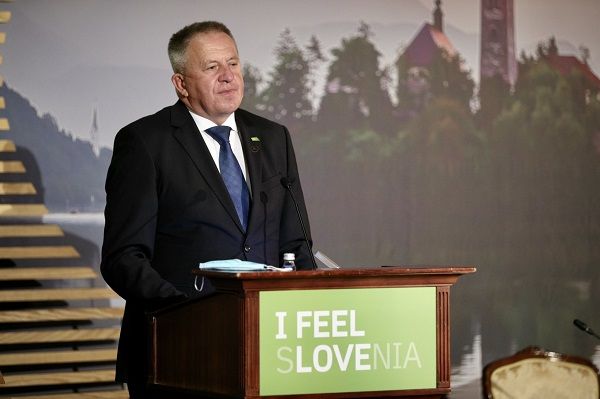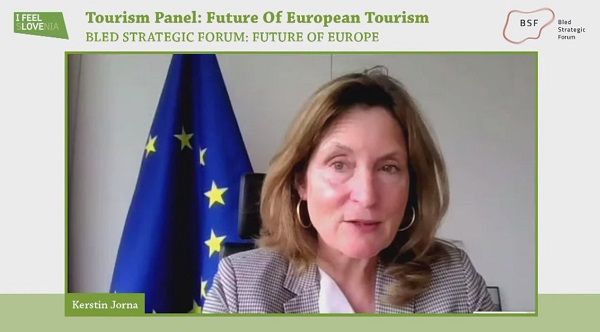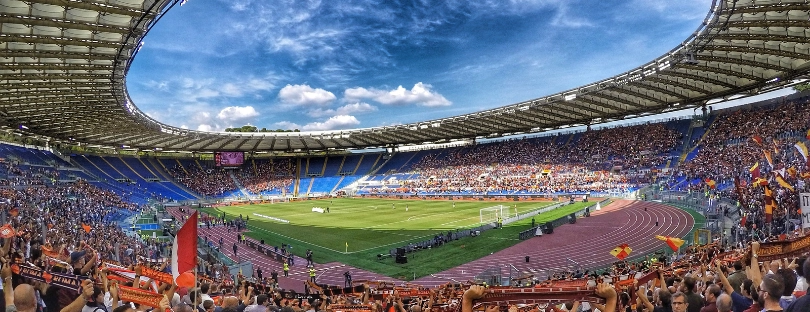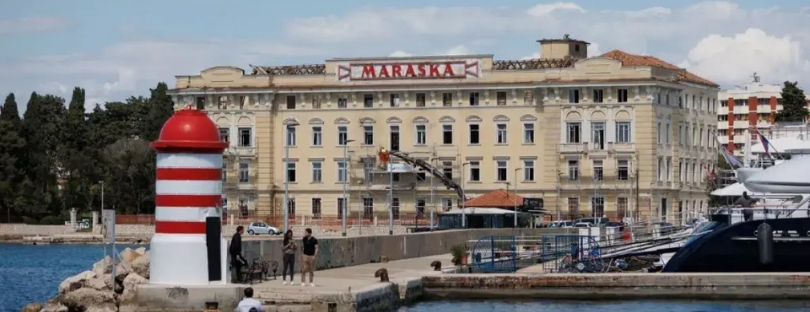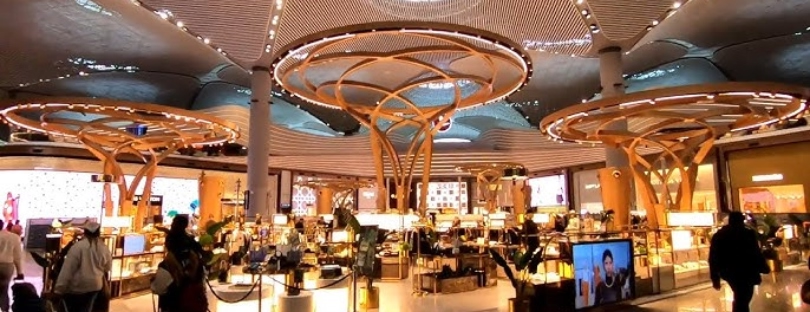
The Tourism Panel at Bled Strategic Forum highlights the key challenges of European tourism
As part of this year’s Bled Strategic Forum, the Tourism Panel hosted renowned international experts, who highlighted one of the key current issues that the tourism industry in Europe deals with today: What will the future bring? European tourism challenges
Prominent international and Slovenian experts, guests, panelists and representatives of Slovenian tourism were addressed by Minister of Economic Development and Technology Zdravko Počivalšek, Director-General for the Internal Market, Industry, Entrepreneurship and SMEs at the European Commission Kerstin Jorna, Director of the Slovenian Tourist Board (STB) MSc. Maja Pak, Director of Regional Department for Europeat at the World Tourism Organization (UNWTO) Prof. Alessandra Priante and Director of the Portugal National Tourist Board and President of the European Travel Commission (ETC) Luis Araújo.
As part of the 16th Bled Strategic Forum (BSF), a panel entitled The Future of European Tourism was held for the 7th time in a row. At the panel, prominent personalities from the tourism industry discussed the challenges of tourism today and tomorrow. Watch the video here.
The pandemic has posed many questions to tourism, among the most pressing ones are survival and recovery, along with transforming the tourism industry into a more resilient and more sustainable one.
The pandemic has posed the biggest challenge to tourism to date and a crisis that has been going on for the second year in a row now. According to the UNWTO, from January to May this year, international revenues decreased by 85 % compared to 2019, and by 65 % compared to 2020. Despite the difficult situation in tourism sector due to the Covid-19 pandemic, optimism is on the rise and so are optimistic forecasts of key international tourism institutions. According to the ETC survey on Europeans’ travel intentions, around 70 % of Europeans surveyed plan to travel in the next 6 months, half of whom want to visit another European country. The last quarterly ETC report also states optimistic expectations, with demand for travel expected to increase significantly in the second half of 2021, although according to the ETC, international arrivals in 2021 will still be 49 % below pre-pandemic levels. At the same time, consumer behavior has changed dramatically due to the pandemic and other challenges.
This year’s Tourism Panel therefore raises the question What will the future bring to European tourism?
The European Commission has adopted Recovery Assistance for Cohesion and the Territories of Europe (REACT-EU), with an earmarking amount of € 55 billion for the recovery of the European economy after the crisis and The € 750 billion Recovery and Resilience Facility (RRF) that will help make Europe greener, digitalisied and more resilient. It is the largest package of incentives ever funded in Europe.
In his introductory speech, Minister of Economic Development and Technology Zdravko Počivalšek highlighted the future of tourism and described it as a sector that quickly responds to changes: “The last ‘corona’ years have undoubtedly been a great test for European and thus for Slovenian tourism, but I would like to recall the well-known fact that tourism is known as a sector that reacts very quickly to changes in society and adapts to them. This is why I believe that it will be the same this time. With a 70% drop in overnight stays of foreign guests in Slovenia, the recovery will of course be a bit longer, but we must be aware that the trends according to which tourism will develop in the future are something we have been practicing in Slovenia for the last seven years. Boutique, sustainable, safe, tailor-made experiences in tourism are the foundations on which we have built our success already in the past strategic framework. It is also important to emphasize that, according to the findings of Eurostat, we are the country that has increased the volume of domestic tourism to the greatest extent – also thanks to timely and appropriate measures of the state. In the year and a half of the epidemic, the government has supported tourism with one billion funds, thus proving that it is aware of the strategic importance of the industry for the national economy and believes in its further development.”
Kerstin Jorna, Director-General for the Internal Market, Industry, Entrepreneurship and SMEs at the European Commission, highlighted the efforts of EU Member States to safely revive tourism flows and recover tourism: “The joint efforts of the EU Member States in the vaccination campaign and in implementing the EU Digital COVID Certificate have been paramount in the smooth reopening of the travel. By end of August, we had more than 355 million EU Digital Certificates issued. There are 54 countries either connected to the European Digital Certificate Gateway or applying to do so. Just before the summer, the European Commission launched a co-creation process to create a transitional path in tourism. We want to define together with all the stakeholders a roadmap for the industry and destinations, a blueprint of European Tourism that is greener, fit for the digital age and ultimately more resilient and competitive.”
MSc. Maja Pak, Director of the STB, highlighted the key challenges of European tourism in the light of the changed situation and the new conditions posed by the pandemic to the European tourism industry: “Last year, the pandemic plunged tourism into the biggest crisis so far and showed the great economic importance of tourism and its impact on other activities. Many companies are struggling to survive. A precondition for the resumption of tourist flows as soon as possible is coordinated action and intensive coordination between European countries on flow restrictions. At the same time, the pandemic brings challenges and new opportunities for more sustainable, resilient and inclusive tourism. The behaviour of tourists has changed dramatically due to pandemics, climate change and other challenges. For the successful transformation of tourism, it is necessary to redefine performance indicators and better business models that will enable a sustainable and digital transformation. There is a need for close cooperation between all stakeholders: government, tourism organizations and businesses, local communities and employees. To gain back the trust of tourists and to seek the satisfaction of the local population, it is necessary to create better tourism, but we do not want to return to the old tracks. It is therefore necessary to think in advance about the coordinated shaping of the European future of tourism, which is a key theme of this year’s panel.”
Prof. Alessandra Priante, Director of Regional Department for Europe at at the World Tourism Organization (UNWTO), addressed the participants: “Collaboration and cooperation are key to restart tourism, to establish harmonised protocols, that will increase predictability of the procedures before, during and after travel, which in turn is the prerequisite for tourists’ willingness, let alone desire to travel.”
Luís Araújo, President of the European Travel Commission (ETC) and the Director of the Portugal National Tourist Board,pointed out:“The future of Tourism will be brighter if we base our actions in a collective and shared responsibility, focusing on how to transform and improve our sector (from supply to demand). Tourism can and will be, more than ever, a force for good.”
The Covid-19 pandemic brought many challenges to tourism, as well as opportunities European tourism challenges
The introductory presentations were followed by a panel discussion with prominent Slovenian and foreign participants.
The current challenges and opportunities of European tourism were highlighted by Simon Zajc, State Secretary at the Ministry of Economic Development and Technology of Slovenia; Lola Uña Cárdenas, Vice President of Government Affairs at World Travel & Tourism Council; Jane Stacey, Head of Tourism Unit, Organisation for Economic Co-operation and Development; Marie Audren, Director General, Association of Hotels, Restaurants, Pubs and Cafes (HOTREC); MSc. Petra Stušek, Director of Ljubljana Tourism and the President of the Board at European Cities Marketing; and Dr Mario Hardy, former CEO of the Pacific Asia Travel Association (PATA).
Simon Zajc, State Secretary State Secretary at the Ministry of Economic Development and Technology of Slovenia, emphasized the importance of tourism for the Slovenian economy and the measures taken by the state to support the tourism sector: “Slovenian tourism employs almost 7 % of the working population and contributes as much as 10 % to gross domestic product.This is also the reason why the state has been so active in helping tourism during the most difficult months of the epidemic.With last year’s tourism vouchers for all citizens and this year’s vouchers for the promotion of consumption in tourism and related activities, we have significantly supported domestic tourism.For the purpose of accommodation alone, 193 million euros in vouchers were redeemed, and Slovenians also spent 40 million euros in vouchers for accommodation, restaurants, sports and culture.The long-awaited measure to support the meetings industry, city hotels and travel agencies, which have been in a particularly difficult situation as a result of the epidemic, will soon be prepared.”
Lola Una Cardenas also emphasized the importance of tourism and the need for international coordination for the tourism sector: “Governments around the world recognise the importance of travel and tourism as a driver of job creation and growth. The travel sector now urgently needs international coordination to recover the millions of jobs and livelihoods which have been impacted.”
Jane Stacey stressed that tourism will be one of the last sectors to recover and highlighted the issues related to tourism in the future: “What will tourism look like in the future? Much depends on how governments, industry and travellers respond today – we need to take the opportunity to embrace green tourism policies and practices, and enable all tourism stakeholders to benefit fully from the digital transition, if we are to ‘build forward better’.”
Marie Audren pinpointed a number of tourism companies that have not recovered yet. The crisis has a devastating impact on many tourism businesses, especially smaller ones. Therefore, companies need help to restart business. She also emphasized the great importance of investing in the sustainable development of tourism. Before the discussion, she stated: “Tourism and hospitality are an essential part of Europe’s economy, society, and culture. I am looking forward to this year’s Bled Strategic Forum to brainstorm on ways out of the crisis and strategies to make the most of current trends and challenges.” European tourism challenges
MSc. Petra Stušek emphasized the importance and role of the population for the development of tourism: “We highly value the opinion of locals, which is why we regularly survey their opinion about the development of tourism in Ljubljana. By launching the “Tourism makes Ljubljana” campaign, we want to show them the benefits of tourism for everyday life in Ljubljana.”
Dr Mario Hardy emphasized that “the massive social and economic disruptions caused by the recent pandemic should serve as a wake-up call to anyone who finds a false sense of security in stability and predictability. The pandemic highlighted that in the 21st century, change happens at unprecedented speed, is often unpredictable and can be fundamenrally transformative.”
Panelists agreed that the Covid-19 pandemic is having a major impact on the tourism industry and poses many challenges, as well as new opportunities. The crisis is thus an opportunity to address those shortcomings of tourism that have resulted from the expansion of the tourism industry in the last 50 years. It is an opportunity for green, digital and inclusive industry transformation.
Key actions to take for a successful transformation of European Tourism European tourism
The participants of the panel discussion on tourism identified key points for a successful transformation of European tourism:
- Tourist’s confidence in travel needs to be rebuilt.
- Travel protocols and communication and coordination between the Member States concerning travel restrictions, COVID tests and quarantine rules need to be improved.
- Roadmap for sustainable transition is necessary.
- New performance indicators are needed.
- Digital transformation of the tourism industry needs to be supported and promoted.
- Investments and EU funding allocation towards sustainability and digitalization of the tourism industry is required.
- The role of tourism at the EU level needs to be rethought.
- DMO transition in their role to actively facilitate the industry transition process to green, inclusive and digital needs to be supported. European tourism challenges




